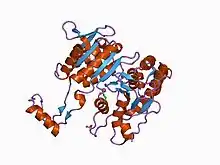Isocitrate/isopropylmalate dehydrogenase family
In molecular biology, the isocitrate/isopropylmalate dehydrogenase family is a protein family consisting of the evolutionary related enzymes isocitrate dehydrogenase, 3-isopropylmalate dehydrogenase and tartrate dehydrogenase.[1][2][3][4]
| Isocitrate/isopropylmalate dehydrogenase | |||||||||
|---|---|---|---|---|---|---|---|---|---|
 crystal structure of k230m isocitrate dehydrogenase in complex with alpha-ketoglutarate | |||||||||
| Identifiers | |||||||||
| Symbol | Iso_dh | ||||||||
| Pfam | PF00180 | ||||||||
| Pfam clan | CL0270 | ||||||||
| InterPro | IPR001804 | ||||||||
| PROSITE | PDOC00389 | ||||||||
| SCOP2 | 1hex / SCOPe / SUPFAM | ||||||||
| |||||||||
Isocitrate dehydrogenase (IDH), is an important enzyme of carbohydrate metabolism which catalyses the oxidative decarboxylation of isocitrate into alpha-ketoglutarate.[1][5] IDH is either dependent on NAD+ EC 1.1.1.41 or on NADP+ EC 1.1.1.42. In eukaryotes there are at least three isozymes of IDH: two are located in the mitochondrial matrix (one NAD+-dependent, the other NADP+-dependent), while the third one (also NADP+-dependent) is cytoplasmic. In Escherichia coli the activity of a NADP+-dependent form of the enzyme is controlled by the phosphorylation of a serine residue; the phosphorylated form of IDH is completely inactivated.
3-isopropylmalate dehydrogenase EC 1.1.1.85 (IMDH) catalyses the third step in the biosynthesis of leucine in bacteria and fungi, the oxidative decarboxylation of 3-isopropylmalate into 2-oxo-4-methylvalerate.[2][3]
Tartrate dehydrogenase EC 1.1.1.93 catalyses the reduction of tartrate to oxaloglycolate.[4]
References
- Hurley JH, Thorsness PE, Ramalingam V, Helmers NH, Koshland DE, Stroud RM (November 1989). "Structure of a bacterial enzyme regulated by phosphorylation, isocitrate dehydrogenase". Proc. Natl. Acad. Sci. U.S.A. 86 (22): 8635–9. doi:10.1073/pnas.86.22.8635. PMC 298342. PMID 2682654.
- Imada K, Sato M, Tanaka N, Katsube Y, Matsuura Y, Oshima T (December 1991). "Three-dimensional structure of a highly thermostable enzyme, 3-isopropylmalate dehydrogenase of Thermus thermophilus at 2.2 A resolution". J. Mol. Biol. 222 (3): 725–38. doi:10.1016/0022-2836(91)90508-4. PMID 1748999.
- Zhang T, Koshland DE (January 1995). "Modeling substrate binding in Thermus thermophilus isopropylmalate dehydrogenase". Protein Sci. 4 (1): 84–92. doi:10.1002/pro.5560040111. PMC 2142962. PMID 7773180.
- Tipton PA, Beecher BS (August 1994). "Tartrate dehydrogenase, a new member of the family of metal-dependent decarboxylating R-hydroxyacid dehydrogenases". Arch. Biochem. Biophys. 313 (1): 15–21. doi:10.1006/abbi.1994.1352. PMID 8053675.
- Cupp JR, McAlister-Henn L (November 1991). "NAD(+)-dependent isocitrate dehydrogenase. Cloning, nucleotide sequence, and disruption of the IDH2 gene from Saccharomyces cerevisiae". J. Biol. Chem. 266 (33): 22199–205. doi:10.1016/S0021-9258(18)54554-3. PMID 1939242.